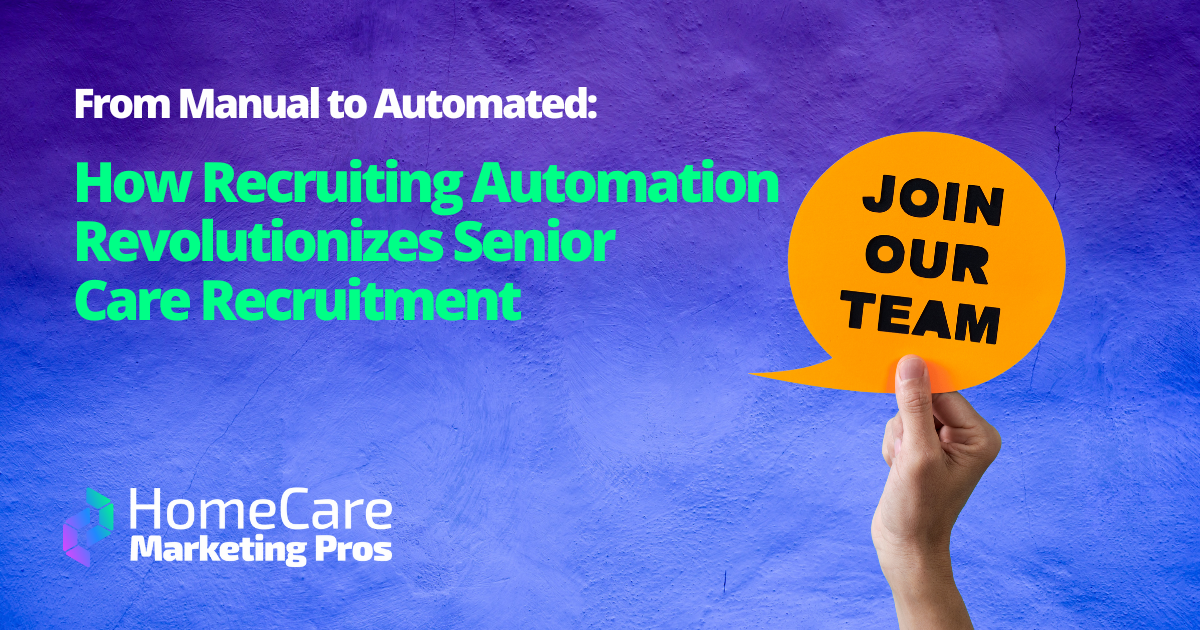Experienced home care agency leaders know the importance of retaining terrific caregivers. Great aides are scarce, and recruitment costs are high. In addition, many companies are growing in size, so any loss of existing staff is a step in the wrong direction.
While there’s much to be said about hiring campaigns, the topic of caregiver retainment deserves its own discussion. Here are 10 ways home care agencies can match their aggressive home health marketing efforts with an effective caregiver retention strategy.
Flexible & Timely Payment Options –
In a world of PayPal, instant bank transfers via smartphone and cryptocurrency, there’s no excuse for having antiquated payroll systems. While most agencies won’t be paying caregivers in Bitcoin any time soon, it’s certainly reasonable to offer flexible, digital options. All agencies should seriously consider weekly payment via direct deposit.
Keep Caregivers Working –
Obviously, home care agencies can only offer assignments that actually exist. This reality is one of the ancillary benefits of aggressive home health marketing that continually brings-in new clients. But, home care staffers must also maximize the work that is available in order to keep caregivers busy.
Home care agencies should strive to reward proven caregivers with additional work that will help ensure loyalty and tenure. Although it’s essential to give new hires their first “break,” savvy managers should prioritize lucrative assignments based on merit and prior results. Good caregivers are easily wooed by competitors with promises of steady work.
Respect Schedule Limitations –
Keeping great caregivers busy is an effective retention strategy, but overworking them has the opposite effect. Desperate staffers sometimes “force” aides into accepting too much work when confronted with urgent situations or caregiver shortages. While it’s important to find coverage for all clients, agencies must avoid high-pressure tactics and the appearance of taking advantage.
Cover All Incidental Expenses –
Home care agencies sometimes fail to appreciate the financial burden on caregivers who must provide their own supplies. From latex gloves to clients’ requests for snacks, the out-of-pocket costs can add up. Offices must ensure that they keep plenty of commonly-used supplies in stock for complimentary caregiver use and properly reimburse mileage
Treat Caregivers Like Family Members –
Today’s job market is very favorable, so many companies work hard to show employees their appreciation. Unfortunately, these efforts often don’t extend to caregiver teams that work in the field. Home care agencies should avoid creating a culture that separates caregivers from office staff. Instead, they should include caregivers in all company events whenever possible.
Provide Incentives for Good Work –
Too often great employees go unnoticed, or their pay reflects that of lower-performing workers. Home care agencies must be sure to provide appropriate incentives to caregivers. Outstanding team members should receive higher hourly rates and should also qualify for bonuses or other rewards.
Offer Benefits Including PTO –
Changing laws and increasing competition has created an environment where many caregivers now qualify for basic healthcare insurance. However, forward-thinking agencies shouldn’t stop there. There’s no reason in the world not to offer hard-working caregivers PTO and perks afforded the office staff.
Create Promotion Opportunities –
Few things motivate employees more than career advancement. This is another incentive that is often provided to office workers but overlooked for caregivers in the field. Growing agencies need experienced caregivers who can train others and provide oversight, so it only makes sense to create better-paying supervisory positions for proven aides.
Provide Paid Training & Continuing Education –
Many non-medical caregivers are unlicensed but looking to grow their careers in healthcare. It may seem counterintuitive for a home care agency to pay for a worker’s nursing school tuition, but creative leaders see opportunity in doing so. An agency may consider rewarding an ambitious aide with tuition reimbursement in exchange for working as a caregiver supervisor upon graduation.
Walk in Their Shoes! –
Some good business practices are also matters of common sense. All home care agency managers must consider the realities of their caregivers. Many aides struggle to make ends meet, and this is especially true in places with high costs of living.
Company leaders must stay sensitive to their caregivers’ needs, both professionally and personally. If a worker asks to take off early to deposit a check at the bank or fix a flat tire, give her the benefit of the doubt. Small problems in life are much bigger for folks living paycheck to paycheck.
When it’s all said and done, most home care agencies truly value their caregivers. However, sometimes the message of gratitude doesn’t come through loud enough. Forward-thinking companies that match their aggressive home health marketing campaigns with equally robust employee retention programs are best positioned for continued growth.











